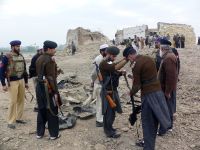The UN Human Rights Commission meeting in an emergency session in Geneva Thursday agreed to set up a commission of inquiry into human rights violations by Israel in the Palestinian Territories.
Nineteen of the Commission's 53 members supported the proposal, presented by Arab and Muslim states, after three days of discussions at a rare special session of the Commission.
Western countries, notably those in the European Union, United States and Canada, made up the 16 members, which voted against the resolution.
Another 17 members abstained and one member was absent.
Arab and Muslim states called for the meeting in response to three weeks of violent clashes across the West Bank and Gaza Strip between Palestinians and Israelis. More than 110 people, mostly Arabs, have died in the violence.
The UN forum's members also agreed to ask UN High Commissioner for Human Rights Mary Robinson to urgently visit the Palestinian Territories to "take stock" of the human rights violations of Palestinians.
After the vote, Israel's Ambassador Yaakov Levy said the resolution was inflammatory and one-sided.
"Supreme diplomatic efforts, not biased deliberations are what is needed now to take us beyond the current violence and bloodshed, to stabilize the situation, to end hostilities and thereafter hopefully restart the diplomatic process," he said.
"This committee has adopted a resolution which could rather aggravate and indeed destroy the efforts underway to end the violence," Levy added.
Saying the Commission had confirmed it was the "conscience of mankind", Palestine's Permanent Observer to the UN Nabil Ramlawi said the supporters of the resolution had acted "in the service of human rights and in the service of this Commission".
Commission members voted after being unable to reach a consensus over how to respond to the violence.
France's Ambassador Philippe Petit told the Commission that rather than support the outcome of Tuesday's Sharm el-Sheikh summit of Middle East leaders, the resolution endangered it "by wanting to set up mechanisms competing with those agreed by the directly interested parties".
Diplomatic sources said earlier the EU had also opposed wording in the resolution, which referred to war crimes and crimes against humanity by Israel.
US Ambassador Nancy Rubin said the move offered "no pathway to reconciliation among peoples who though on the brink of conflict were so recently on the very brink of a final peace settlement".
The US valued the potential of the Commission to contribute to the protection of human rights, she said.
"We regret therefore to see this potential squandered in an effort which risks undermining the only prospect before us of a better future for Palestinians and Israelis alike," Rubin said.
Israeli Prime Minister Ehud Barak and Palestinian leader Yasser Arafat agreed Tuesday to try to end the violence and to set up a fact-finding committee into the clashes which erupted after Israel's opposition leader Ariel Sharon visited a disputed holy site in Jerusalem on September 28.
Speaking here, UN Human Rights Commissioner Mary Robinson repeated a call by the UN Secretary General Kofi Annan and others "for all parties to refrain from any words or actions which could exacerbate an already extremely tense situation".
A Jewish settler and a Palestinian were killed in fighting in the northern West Bank earlier Thursday as the two sides attempted to implement a tentative truce reached in Egypt.
The commission of inquiry set by the UN Human Rights Commission would spend three months in the region -- GENEVA (AFP).
© 2000 Al Bawaba (www.albawaba.com)







